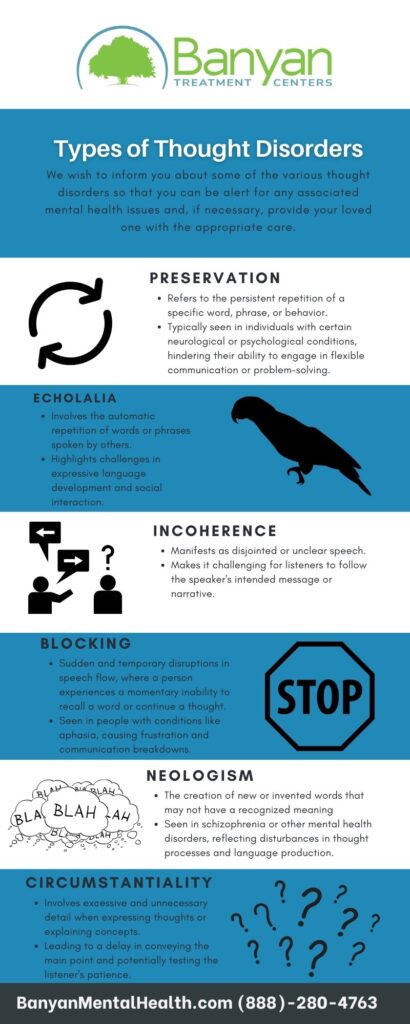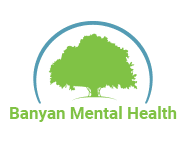


First Responders and Mental Health
May 8, 2019

Celebrities Who Struggle with Mental Health Disorders
May 29, 2019What Are the Different Types of Thought Disorders?


“The cat fell silly cows struggle down.” “Through the tunnel, purple mountain a desk eat ruby jade.”
While these sentences don’t seem to make any sense, they’re a common occurrence in many individuals with thought disorders. Though disorders can impact the organization, content, and flow of an individual’s thoughts and speech, encompassing a spectrum of conditions that can impair cognitive functioning and interpersonal interactions. Today, the experts at our residential mental health facilities are delving into the diverse types of thought disorders out there, detailing their unique symptoms. Keep reading to learn common examples of thought disorders and how our mental health experts effectively treat them.
What Is a Thought Disorder?
A thought disorder refers to a disruption in a person’s usual pattern of thinking that’s observed in individuals with mental health disorders. Thought disorders entail abnormalities in the coherence, organization, and logical progression of a person’s thoughts. These irregularities are exhibited as disruptions in the formation and expression of ideas or thoughts, often impairing communication, and interpersonal interactions.
Thought disorders can occur in numerous ways, including derailment (loose associations), tangentiality (off-topic responses), incoherence (lack of logical flow), and poverty of thought (restricted content). These abnormalities reflect an underlying problem associated with cognition and can negatively impact a person’s ability to effectively share their ideas and engage in meaningful conversations.
Common Examples of Thought Disorders
As providers of dual diagnosis treatment, we come across people with various mental health problems as well as addiction issues. Thought disorder first appeared in scientific literature around the 1980s, when it was initially described as a symptom of schizophrenia. Each type of thought disorder has unique symptoms. While it is common for individuals to display some of the symptoms of thought disorder occasionally, thought disorder is not classified until it negatively affects the person's ability to communicate.


Here are some common examples and types of thought disorders:
- Alogia: Also known as poverty of thought, this thought disorder is characterized by brief and unelaborated responses to questions. People with this type of thought disorder rarely speak unless prompted, and it is often seen in individuals with dementia or schizophrenia.
- Blocking: When a person seems unable to complete their thought because of constant pauses, they are likely experiencing blocking.
- Circumstantiality and tangentiality: The circumstantial type of speech is superfluous and roundabout. The speaker will go off on irrelevant tangents before coming back to the main point of the story. Tangential thinking involves abrupt changes in subject matter that are unrelated to the initial topic.
- Clanging or clang association: A person with a clanging thought process makes word choices based on the sound of the word rather than the meaning of the word. They may rely on using rhymes, alliterations, or puns and create sentences that do not make sense. A clanging thought process is a common symptom of mania in bipolar disorder.
- Concrete thinking: Individuals with this thought disorder struggle with abstract reasoning and instead rely heavily on literal and concrete interpretations of information. This is often seen in conditions like autism spectrum disorder.
- Delusional thinking: Individuals who experience delusional thought disorders hold false beliefs that are resistant to reasoning or evidence disproving them. These beliefs can range from paranoid delusions (belief in being chased or persecuted) to grandiose delusions (exaggerated sense of self-importance).
- Disorganized thinking (formal thought disorder, or FTD): Also referred to as disordered thinking and disorganized thought process, disorganized thinking occurs in individuals with schizophrenia and schizoaffective disorder, where individuals display disjointed, illogical, and incoherent thinking. Typical disorganized thinking examples and symptoms include tangentiality (deviating off-topic), derailment (loose associations), and thought blocking (sudden interruption of thought process).
- Echolalia and echopraxia: People experiencing echolalia repeat other people’s words or phrases, while individuals with echopraxia mimic the movements and gestures of others.
- Flight of ideas: Common in bipolar disorder, flight of ideas refers to a rapid and continuous flow of thoughts that are loosely connected, making it difficult for the individual to maintain a coherent conversation.
- Incoherence: Also referred to as “word salad” and incoherent thought process, this disorganized thinking example affects the order of words and semantics, making it difficult for the individual to create consistent speech.
- Neologism: Also referred to as neologism thought process, a person who struggles with neologism will often create new words or expressions when they talk.
- Perseveration thought process: Also referred to as preservative thought process, this type of thought disorder refers to the repetition of words or topics excessively and obsessively.
- Pressure of speech: A person with pressure of speech problems will speak at a faster rate and often in a higher volume. It can be difficult to get a word in with this person.
- Thought broadcasting: Also associated with schizophrenia, this thought disorder example involves the conviction that one’s thoughts are being broadcasted aloud so people around can hear the thoughts.
- Thought insertion and withdrawal: Common in individuals with schizophrenia, these involve the belief that thoughts are being embedded into one's mind (insertion) or forcibly removed from one's mind (withdrawal) by external forces or entities.
- Word approximations: This thought disorder refers to the abnormal and incorrect use of words in the middle of sentences.
Understanding these various types of thought disorders is essential for mental health professionals working in treatment facilities, as it enables individualized assessment, diagnosis, and interventions to address the specific cognitive disturbances exhibited by clients. If your loved one is exhibiting signs of a mental health disorder, our PHP facilities for mental health can help.
Call Banyan Mental Health today at 888-280-4763 to learn more about our adult mental health services for schizophrenia, bipolar disorder, and more.
Related Reading:







